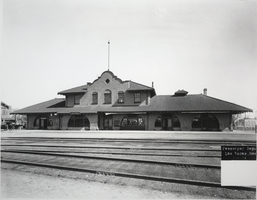Search the Special Collections and Archives Portal
Search Results
Carol Harter oral history interview
Identifier
Abstract
Oral history interview with Carol Harter conducted by Claytee D. White on June 18, 2021 for the Boyer Early Las Vegas Oral History Project.
Carol Harter is the longest-serving President of UNLV, from 1995 until 2006. The campus experienced unprecedented growth during that time, including the addition of a new, very large library. Harter grew the campus from 19,000 to 28,000 students, added 23 new or completely renovated buildings to the campus, and with a student-centered focus, added more than 100 new degree programs. Two professional schools, the Dental School and Boyd School of Law, added greatly to the prestige and academic Top Tier status of UNLV.
Her partnership with Glenn Schaeffer, former president of the Mandalay Resort Group, assisted in the early work of the Black Mountain Institute (BMI) Modern Letters program. BMI is an international think tank dedicated to advancing literary and cross-cultural dialogue. This was an important goal to Harter and Schaeffer, who were both literature majors. Harter also discusses many community members who made an impact on UNLV including Joe Crowley and Dr. Juanita Fain.
Archival Collection

Dr. Linda K. Miller oral history interview: transcript
Date
Archival Collection
Description
Oral history interview with Dr. Linda K. Miller conducted by Claytee D. White on July 10, 2019 for Boyer Early Las Vegas Oral History Project. In this interview, Dr. Miller discusses her early life in Kansas City, Kansas and arriving to Las Vegas, Nevada in 2002. She talks about Helen J. Stewart, the Old Mormon Fort, and the significance of that area. Later, Dr. Miller explains the importance of teaching local history to people in Las Vegas. Lastly, Dr. Miller discusses the process of writing a book about Helen J. Stewart.
Text
Beverlee and Ivan Cannon oral history interview
Identifier
Abstract
Oral history interview with Beverlee and Ivan Cannon conducted by Claytee D. White on April 12, 2011 for the Boyer Early Las Vegas Oral History Project. In this interview, the Cannons discuss their personal histories and living in Las Vegas, Nevada during the 1950s. Beverlee Cannon describes her father's ice company, and later describes the work she and Ivan did for the Nevada Test Site and Los Alamos National Laboratory in New Mexico while contracted through Reynolds Electrical & Engineering Company. Ivan Cannon talks about his time in the United States Navy during World War II and working for the Southern Nevada Telephone Company. The couple also jointly discuss divorcing their former spouses so they could marry each other and going to India to study transcendental meditation, later bringing back what they learned and teaching people in the United States.
Archival Collection
Helen Manix oral history interviews
Identifier
Abstract
Oral history interviews with Helen Manix conducted by Art Rader on October 29, 1974 and November 01, 1974 for the Ralph Roske Oral History Project on Early Las Vegas. In the interviews, Helen Manix discusses moving to Boulder City, Nevada in 1939 with her husband, John Manix, to operate a general merchandise store. Helen Manix and her son, Joseph "Joe" Manix, Jr., also discuss their local community, Boulder (Hoover) Dam, and their experiences in Boulder City during World War II.
Archival Collection

Photograph of the Union Pacific Railroad Passenger Depot, Las Vegas, 1924
Date
Archival Collection
Description
Image
Barbara and David Lowe oral history interview
Identifier
Abstract
Oral history interview with Barbara and David Lowe conducted by Claytee D. White on December 08, 2015 for the Boyer Early Las Vegas Oral History Project. David Lowe begins the interview by discussing his family history, how they came to own a hotel in Goodsprings, Nevada, and life in the town during the early twentieth century. Barbara Lowe then describes her upbringing in San Francisco, California before moving with her family to Hawthorne, Nevada. She also discusses race relations there and in other Nevada and California towns. David Lowe then talks about his mother, Celeste Lowe, who became a writer and was later hired by the University of Nevada, Las Vegas (UNLV), where she worked in Special Collections at the James R. Dickinson Library. David continues, talking about his career in journalism, working at the Nevada Test Site, and the university hospital. They also discuss the controversy surrounding the UNLV mascot and the cultural differences between Northern and Southern Nevada.
Archival Collection

Transcript of interview with Bruce Layne by Claytee D. White, June 18, 2004
Date
Archival Collection
Description
Bruce Layne came to Las Vegas in March of 1955 when he was 10 years of age. He attended High school at Bishop Gorman and college at the University of Nevada Las Vegas where he received a B.S. in Economics. In college, he played baseball for three years and was named All Conference Player in 1966. Growing up in Las Vegas, two of his closest long time friends are Governor Bob Miller and Tito Tiberti. Bruce later went on to become the President of Layne & Associates Insurance which was the largest Insurance Agency in Nevada. Bruce tells fabulous stories of his 40-year experience in the Las Vegas community. When he first arrived there were only about 25,000 people living here. Since then, Bruce has been witness to the enormous growth the city has undergone. Throughout the interview, he discusses his book, My Gift, which he wrote after he discovered he had Parkinson's disease in 1999. The book contains valuable advice on life and it has touched the lives of many people who have read it. Today Bruce Layne is relentlessly fighting his battle with Parkinson's disease both for himself and for thousands of others. He continues to have a positive attitude and is supported by his wife, Sherry Layne, and his two sons, Chad and Trevor. VI
Text

Transcript of interview with Dorothy George by Claytee White, October 13, 2003
Date
Archival Collection
Description
After serving as a nurse in World War II in Hawaii, Okinawa and Japan, Dorothy returned home to Chippewa Falls, Wisconsin. She experienced a particularly bad winter and she set out for California but stopped in Las Vegas to visit the family of her traveling companion, a girlfriend from her home town. The girlfriend returned to Wisconsin and George applied for a nursing license and got it within three days. She never left. Dorothy met her husband while working the night shift at Clark County Hospital. He would come in regularly to assist his patients in the births of their babies. Their occupations and their service in World War II drew them together in a marriage that has lasted over fifty years. From 1949 to this interview in 2003, Dorothy George has seen Las Vegas grow from a town that she loved to a metropolitan area that is no longer as friendly. She reminisces about the Heldorado parades, family picnics at Mount Charleston, watching the cloud formed by the atomic bomb tests, raising six successful children, leading a Girl Scout Troop, and working in organizations to improve the social and civic life of Las Vegas.
Text
Pamela DiMiceli, Leslie Fox-Priest, Jenna Fox, Steven Fox, and Jeffrey Fox oral history interview
Identifier
Abstract
Oral history interview with Pamela DiMiceli, Leslie Fox-Priest, Jenna Fox, Steven Fox, and Jeffrey Fox conducted by Claytee D. White on November 22, 2019 for the Boyer Early Las Vegas Oral History Project. In this interview, siblings Pamela, Leslie, Steven, and Jeffrey talk about their family background and upbringing in Las Vegas, Nevada. Pamela and Jeffrey remember attending Las Vegas High School, going to the movies at the Fremont, El Portal, and the Fox theaters, and school integration. Steven describes his childhood in Las Vegas and his educational experience. Jenna is the daughter of Leslie and also participates in the interview.
Archival Collection
Lubertha Johnson oral history interview
Identifier
Abstract
Oral history interview with Lubertha Johnson conducted by Larry Buckner on February 10, 1978 for the Ralph Roske Oral History Project on Early Las Vegas. In this interview Lubertha Johnson discusses her family background, work experience, civic activity, and philosophy. She talks about discrimination in the workplace for Black people, segregation in Las Vegas, Nevada, and her forty year membership in the National Association for the Advancement of Colored Peoples (NAACP). She also discusses the historic Westside neighborhood and its schools, the prejudice Black performers faced in the 1950s and 1960s, and how she feels disappointed in President Jimmy Carter.
Archival Collection
